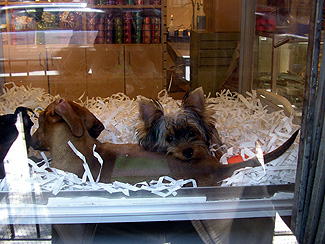 How much is that doggy in the window, the one with the
waggly tail...?" Familiar words to an old tune suggests that many
people at one time or another consider having a dog as a pet. They
might have fond memories of the old Boxer or Cairn terrier that
they grew up with. Maybe it was a good-natured mutt or even a
neighbor's well-behaved German Shepherd. Some folks imagine owning
a beautiful and heroic dog such as "Lassie" of book and screen
fame.
How much is that doggy in the window, the one with the
waggly tail...?" Familiar words to an old tune suggests that many
people at one time or another consider having a dog as a pet. They
might have fond memories of the old Boxer or Cairn terrier that
they grew up with. Maybe it was a good-natured mutt or even a
neighbor's well-behaved German Shepherd. Some folks imagine owning
a beautiful and heroic dog such as "Lassie" of book and screen
fame.
Often, the reality is that many pups purchased on impulse wind up
in shelters or banned to a chain in the garden because they didn't
measure up to the dream. This is written to help you consider the
answers to the questions you should ask before buying that cute
little puppy.
Are you ready for a life long commitment to responsible dog
ownership? Let's think through and visualize what dog ownership is
really like. It is fun to imagine walking an obedient dog on a
beautiful day, but remember, the same dog will need walking when
its hot, cold, raining or icy out. The "Obedient" part will take
time and effort. In deciding whether a dog will fit into your
lifestyle, the biggest consideration in the long run will be "Do
you have the TIME it takes to own a dog?
Questions
Some dogs need more time than others do, but every dog requires
time for daily interaction beyond just meeting its basic needs.
Consider your lifestyle and personality when deciding if a dog
would fit into the picture.
Why do you want a dog?
How active and busy are you?
What do you do with the dog when you travel or are on
vacation?
Do you have young children?
Do you have a fenced garden?
How big is it?
How long at a time will the dog be alone in the home?
Does anyone have allergies? (Easier to find this out visiting
someone else's dog first) Would you have the time to start with an
untrained puppy or would you be willing to re-train an older
dog?
What kind of fur and how much grooming/shedding are involved?
What size would fit in?
Purebred? Mixed? Male? Female? Large? Small?
Dogs needs
Puppies and adult dogs have daily needs. The basics are shelter,
food and water, grooming, health care, training, exercise and
social interaction. The earlier in life you start teaching a pup
what is expected of it the better, but the more it has to learn.
With an older dog, there may be some bad habits they'll have to
'unlearn'. Early social experiences set the tone for a dog's
development into a dependable companion or a destructive
nuisance.
Training
Socialization Puppy Training (9-18 weeks.) will certainly mold the
pup during its most impressionable period and helps provide an
environment for learning positive associations with new people,
places, experiences and other dogs. Patterns are set for life in
these formative weeks. However it is essential that young dogs from
4 months to one year attend training classes.
 Cost
Cost
Besides training, there are other expenses incurred with dog
ownership. After the initial purchase, the biggest portion will go
toward veterinary and feeding bills. A high quality food costs more
'per bag' but is very cost effective in terms of better health and
food efficiency (you feed less). Veterinary start-up costs,
including immunizations and worming, Microchips are also required
by law for identification is not cheap. Neutering and spaying
usually takes place around 6 months. Semi-annual vet visits,
heartworm testing and preventative medications, unexpected
illnesses or accidents all add up! Then there is the control of
internal and external parasites to consider (worms, fleas, ticks,
mosquitoes and mites etc.)
Grooming requires the proper tools to care for coat, ears, teeth,
and nails. (For some breeds, there is the additional expense of a
professional groomer 8-9 times a year.) Microchips are also
required by law for identification.
Basic supplies include sturdy food and water bowls, leash and
collar, bedding, cage, chew toys, food treats, indoor gates,
outdoor fencing, kennels and housing.
Although lovable, puppies and dogs will create additional cleaning
work around the home. (Accidents: diarrhea, urine, vomit), shedding
hair, muddy paws, drool, tracked on floors and carpeting, nose
prints on windows etc.) Responsible dog ownership dictates cleaning
up dog garden waste, keeping dogs reasonably quiet and confined to
their own property. Dogs are known for destructive chewing and
digging holes. These problems can only be successfully dealt with
through supervision and confinement and early puppy training
(starting at two months.)
So, why on earth would anyone want a dog with all the work, time
and expense of owning one? For many reasons, but the biggest one
for most people is that they enjoy the loyalty and companionship of
a dog. Dogs like to play. Folks like the way they interact in the
family, the way that the dog looks and the home security a properly
trained dog can add. If you are willing to make a time commitment
for the next 10 years (the average life span of a dog); knowing the
responsibility and expense of owning a dog and fully aware of the
likely negative elements involved, then, the next step would be to
decide what kind of dog best fits into your lifestyle.
Breeds
Do not make the drastic mistake of choosing a breed solely on its
'looks'. Although this is one consideration, the temperament, size,
activity level and coat care are even more important
considerations. Unfortunately a pup is sometimes chosen impulsively
because it looked like a 'cute little teddy bear' and then the
teddy grows up to me more like a 'grizzly' because the breed is a
type bred for high levels of aggression. Or a pup may prove to have
an energy level that requires more exercise and attention than can
be provided.
Research
Research the breeds that appeal to you. Libraries carry breed books
and local veterinarians may be able to put you in touch with
reputable breeders. Local dog shows allow you to view a variety of
purebred dogs. Find out about the positive and the negative traits
of each breed you are considering. Ask questions: How big do they
get? How much grooming is required? How aggressive are they? How
active? How much exercise is required? Are they good with children?
Are allergies a consideration? Don't discount mixed breeds.
As quoted by the RSPCA and National Canine Defence League "
Never buy a dog from a pet shop or any retail outlet. Never take
one from street markets, or from any place where you cannot see the
mother." Visit your local Animal Rescue Society for advice and to
discuss the options of adopting a rescue dog or puppy. All Animal
Rescue Shelters are obligated to furnish you with a signed
Veterinary Health Certificate.
Like humans, dogs need company, so do not leave him alone all day.
Dogs that become lonely and bored are more likely to bark and
become destructive. If you really care for your dog you will train
him properly and learn that play is one of the most essential
ingredients in a good owner.
In an ideal world every puppy would have a suitable home to go to
and a caring owner. Sadly this is not the case. Many thousands of
unwanted and abandoned puppies and dogs are destroyed each year.
Neutering in the only guaranteed way of preventing unplanned
puppies being born, if you consider the horrific alternative
methods of population control for dogs, it really is the kindest
cut.
Brought to you by: World Wide Information Outlet - http://certificate.net/wwio/, your source of FREEWare Content online.
Do you have any problems with your pet? Then why not send your problem to DAVID THE DOGMAN. David is a Canine Behaviorist who works and lives in Marbella, Spain. Tel/Fax (00345) 2883388. His web site is located at: http://www.thedogman.net. David has his own radio and TV shows, and writes for many newspapers and magazines. David has been working with dogs for many years and started his career in Israel, working on the Border Police. He has been involved in all forms of training, including air sea rescue, air scent work, and has trained dogs for finding drugs. David has devoted the past 10 years to studying behavior and the very passive approach. He does not use choke chains, check chains, or any form of aggression.
David The Dogman is available for private consultations in your home, for further details telephone; Tel; (95) 2883388



